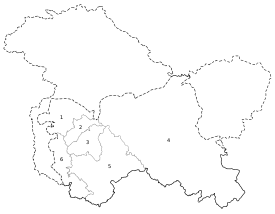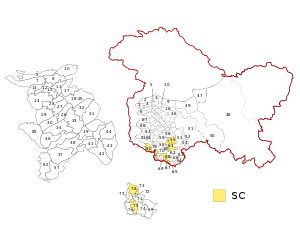Elections in Jammu and Kashmir
Elections in Jammu and Kashmir include elections to the Parliament of India, both houses of the bicameral state legislature (now union territories), and various other local level bodies such as municipalities and Panchayat constituencies.
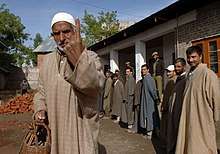
There are 87 assembly constituencies and 6 Lok sabha constituencies (parliamentary constituencies).[1][2] Legislative assembly elections have been held 11 times in the state since 1951 whereas Parliamentary elections have been held 12 times since 1967. Municipal elections have been held in the state only four times since 1947, with the October 2018 elections being the fifth time they were held.[3][4]
Jammu and Kashmir National Conference (JKNC), Jammu & Kashmir People's Democratic Party (PDP) and Indian National Congress (INC) have been the dominant political parties in Jammu and Kashmir. But in recent years the vote share of Bharatiya Janata Party has increased considerably for the parliamentary elections in the state, from 12.45% in 2008 to 23% in 2014.[5]
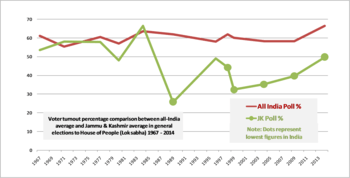
Background
Legal Provisions
Constitution of India give power to the Election Commission of India to oversee the establishment of the electoral roles as well as organize the elections to both the Legislative Assembly and Legislative Council in Jammu and Kashmir.
Elections to elect all the 111 members of the Legislative Assembly is based universal adult suffrage from people among the state constituencies. The Legislative Council (Vidhan Parishad) of Jammu and Kashmir has 36 members. Out of these 22 members are elected according to a "system of proportional representation by means of the single transferable vote", 6 members are elected from among members municipal council, town area committees, notified area committees, Panchayats and other bodies.[9]
Panchayat elections which are held for sarpanch and panch constituencies as part of the Panchayati Raj system in the state are held according to the provisions in the Jammu and Kashmir Panchayati Raj Act 1989.[10][11] The authority to form the 'Panchayat Electoral Rolls' and to the conduct Panchayat elections are given to the Chief Electoral Officer, Jammu and Kashmir.[12] Municipal elections in Jammu and Kashmir are conducted on the basis of the Jammu and Kashmir Municipal Act 2000.[13]
Major Political Parties
This list includes state parties as well as national parties. It also include political parties which no longer exist
- MC: All Jammu and Kashmir Muslim Conference, founded in 1932, renamed JKNC in 1939
- JKNC: Jammu & Kashmir National Conference, merged with INC in 1965
- PC: Jammu & Kashmir Political Conference, separated from JKNC in 1947
- PF: Jammu & Kashmir Plebiscite Front, founded in 1955, renamed as JKNC in 1977
- ANC: Awami National Conference, break-away faction of JKNC, 1984-1986
- INC: Indian National Congress, national party, commonly known as Congress Party.
- PDP: Jammu & Kashmir People's Democratic Party, split from INC in 1998[14]
- PP: Jammu & Kashmir Praja Parishad, merged with BJS in 1963
- BJS: Bharatiya Jana Sangh, merged into Janata Party in 1977, revived as BJP in 1980
- Janata: Janata Party, formed in 1977, disintegrated in 1980
- BJP: Bharatiya Janata Party, national party.
- Jamaat: Jamaat-e-Islami Kashmir, formed soon after 1947, contested elections since 1972 (under the MUF umbrella in 1987)[15]
- MUF: Muslim United Front, a coalition of Muslim nationalist groups (Jamaat-e-Islami, Ummat-e-Islami, Anjunmane Ittehad-ul-Musalmeen) that contested elections in 1987.[16]
- PSP: Praja Socialist Party, 1953-1977, merging into the Janata Party in 1977
- JD: Janata Dal
- HM: Harijan Mandal, 1951-1972
- Panthers: Jammu and Kashmir National Panthers Party, formed in 1982
- JKAP: Jammu and Kashmir Apni Party, formed 2020
- JKPM: Jammu and Kashmir People's Movement, formed 2019
Lok Sabha elections
Jammu and Kashmir has taken part in 12 general elections to the Lok Sabha of India.[17] The first time that Jammu & Kashmir sent elected members to the Lok Sabha was in 1967. Elections were not held in 1990 in Jammu and Kashmir due to insurgency in the region.[18]
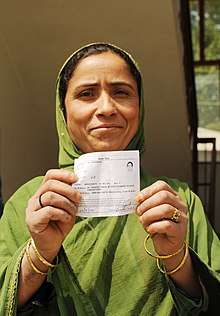
The table below shows how the Indian National Congress (INC) and Jammu and Kashmir National Conference (JKNC) have won the most Lok Seats in the state since 1967. JKNC and INC has won the seats 27 times each. The other parties won seats in general elections to the Lok Sabha from Jammu and Kashmir are Jammu & Kashmir People's Democratic Party 4 times, Bharatiya Janata Party 13 times, Janata Dal only 1 time and independent candidates 6 times.
Keys: JKNC (27) INC (27) BJP (13) Independent (6) JKPDP (4) JD (1)
| Election Year | Winners | ||||||
|---|---|---|---|---|---|---|---|
| Total | Baramulla | Srinagar | Anantnag | Ladakh | Udhampur | Jammu | |
| 1967 | INC: 5/6[19] | INC | JKNC | INC | INC | INC | INC |
| 1971 | INC: 5, Independent: 1 | INC | IND | INC | INC | INC | INC |
| 1977 | JKNC: 3, INC: 1, IND: 1 | JKNC | JKNC | INC | INC | INC | IND |
| 1980 | JKNC: 3, Congress(I): 1, Congress(U): 1 | JKNC | JKNC | JKNC | IND | INC(U) | INC(I) |
| 1984 | JKNC: 3, INC: 3[20] | JKNC | JKNC | JKNC | INC | INC | INC |
| 1989 | JKNC: 3, INC: 2, IND: 1[21] | JKNC | JKNC | JKNC | IND | INC | INC |
| 1991 | Elections Not Held | ||||||
| 1996 | INC: 4, BJP: 1, JD: 1[22] | INC | INC | JD | INC | BJP | INC |
| 1998 | JKNC: 3, BJP: 2, INC: 1[23] | JKNC | JKNC | INC | JKNC | BJP | BJP |
| 1999 | JKNC: 4, BJP: 2[24] | JKNC | JKNC | JKNC | JKNC | BJP | BJP |
| 2004 | JKNC: 2, JKPDP: 1, INC: 1, IND: 1[25] | JKNC | JKNC | JKPDP | IND | BJP | BJP |
| 2009 | JKNC: 3, INC: 2, IND: 1[26] | JKNC | JKNC | JKNC | IND | INC | INC |
| 2014 | BJP: 3, PDP: 3 | JKPDP | JKPDP | JKPDP | BJP | BJP | BJP |
| 2019 | BJP: 3, JKNC: 3 | JKNC | JKNC | JKNC | BJP | BJP | BJP |
Legislative assembly elections
After the Constitution of Jammu and Kashmir was amended, the name Prime Minister of Jammu and Kashmir changed into Chief Minister of Jammu and Kashmir.[27][28]
| Year | Election | Chief Minister (Winning Party/Coalition) | Seats Won | Remarks |
|---|---|---|---|---|
| 1951 | Constituent Assembly | Sheikh Abdullah (JKNC) 1951-1953 (dismissed) Bakshi Ghulam Mohammad (JKNC) 1953-1957 |
Total: 75; JKNC: 75 | Praja Parishad boycotted;
all seats unopposed[29] |
| 1957 | First Assembly | Bakshi Ghulam Mohammad (JKNC) 1957-1962 | Total: 75; JKNC: 69 PP: 5, HM: 1 |
47 seats unopposed[30] |
| 1962 | Second Assembly | Bakshi Ghulam Mohammad (JKNC) 1962-1963 Khwaja Shamsuddin (JKNC) 1963-1964 Ghulam Mohammed Sadiq (INC) 1964-1972 |
Total: 74; JKNC: 68 PP: 3, independents: 3 |
33 seats unopposed; allegations of malpractices[31] |
| 1967 | Third Assembly | Ghulam Mohammed Sadiq (INC) | Total: 75; INC: 60 |
39 seats unopposed; 118 candidates rejected[32] |
| 1972 | Fourth Assembly | Syed Mir Qasim (INC) 1972-1975 Sheikh Abdullah 1975-1977 |
Total: 75; INC: 58 Jamaat: 5; BJS: 3 |
Plebiscite Front banned; election malpractices[33] |
| 1977 | Fifth Assembly | Sheikh Abdullah (JKNC) 1977-1982 (death) Farooq Abdullah (JKNC) 1982-1983 |
Total: 76; JKNC: 47 INC: 11, Janata: 13 |
free and fair elections[34] |
| 1983 | Sixth Assembly | Farooq Abdullah (JKNC) 1983-1984 (dismissed) Ghulam Mohammad Shah (ANC) 1984-1986 Farooq Abdullah (JKNC) 1986-1987 |
Total: 76; JKNC: 46 INC: 26 |
INC engineered split in JKNC; suppression of protests[35] |
| 1987 | Seventh Assembly | Farooq Abdullah (JKNC) 1987-1990 (dismissed) President's rule 1990-1996 |
Total: 76; JKNC: 40, INC: 26 MUF:4; BJP: 2 |
blatant rigging[16][36] |
| 1996 | Eighth Assembly | Farooq Abdullah (JKNC) | Total: 87; JKNC: 57 INC: 7; BJP: 8; JD: 5; BSP: 4 |
|
| 2002 | Ninth Assembly | Mufti Mohammad Sayeed (PDP) 2002-2005 Ghulam Nabi Azad (INC) 2005-2008 |
Total: 87; PDP: 16, INC: 20, JKNC: 28, Panthers: 4 Independents: 13 |
|
| 2008 | Tenth Assembly | Omar Abdullah (JKNC) | Total: 87; JKNC: 28, INC: 17 PDP: 21, BJP: 11 |
|
| 2014 | Eleventh Assembly | Mufti Mohammad Sayeed (PDP) 2015-2016 (death) Mehbooba Mufti (PDP) 2016 - June 2018 |
Total: 87; PDP: 28; BJP: 25 JKNC: 15; INC: 12 |
Results announced in December 2014, but new government formed in March 2015, after two months of intense negotiations to form PDP-BJP alliance, with BJP's Nirmal Kumar Singh becoming Deputy CM in the beginning [37][38] |
Municipal elections in Jammu and Kashmir
Municipal elections in Jammu and Kashmir are held for positions to municipal corporations (Urban Local Bodies - ULBs) in the region on the basis of the Jammu and Kashmir Municipal Act 2000. Elections to these positions are based on universal adult franchise in electoral constituencies called wards.[13][39][40][41] Since 1947 municipal elections have been held five times in the state. Before 2018, the last Municipal elections in Jammu and Kashmir were held in 2005.[3][4]
2018 municipal elections
The 2018 local elections were held in the state of Jammu and Kashmir in four phases on 8, 10, 13 and 16 October. Voting was held from 7am to 4pm. The days were declared a public holiday in the region.[42] The total number of wards (electoral constituencies) were 1145 out of which 244 wards (4.7%) were uncontested.[43][44] Out of a total of around 17 lakh electors, the final state voter turnout was 35.1%, that is 5.97 lakh electors voted.[45] Counting was held on 20 October 2018.[46] Major political parties in the state such as Jammu and Kashmir National Conference (JKNC) and Jammu and Kashmir People's Democratic Party (PDP) boycotted the elections.[47]
There was vast difference between voting turnout for the Urban Local Bodies, with Srinagar Municipal Corporation getting a poll percentage of 1.8% as compared to Ramgarh Municipal Committee getting a poll percentage of 82.6% in the third phase of voting.[48] In certain wards such as Baghat Barzulla (Srinagar Municipal Corporation), out of a total of 11486 electors, only 61 votes were placed (0.53% voter turnout).[49] On the other hand, wards such as Partap Garh (Jammu Municipal Corporation), out of 3583 electors, 2372 votes were placed (66.2% voter turnout).[50]
In the Srinagar Municipal Corporation, out of the 74 wards, Independent candidates won 53 seats, Indian National Congress won 16 seats, Bhartiya Janata Party secured 4 seats and 1 ward went vacant ( no votes were cast on that seat ). In the Jammu Municipal Corporation polls, out of the 75 wards, Bhartiya Janata Party secured 43 seats, Independent candidates got 18 seats and Indian National Congress won 14 seats.[51][52] In the Leh municipal committee, Congress won all the 13 seats.[53] BJP for the first time in the electoral history of the state, won 60 seats unopposed, winning at least seven municipal committees in Kashmir valley.[54][55] In Kashmir, 69% of the 598 wards did not require polling.[56][57]
Panchayat elections in Jammu and Kashmir
Jammu and Kashmir Panchayat elections are held in accordance with the provisions of the Jammu and Kashmir Panchayati Raj Act 1989.[10][58]
The 2011 the Panchayat elections consisted of 143 blocks, 4130 Sarpanchs and 29719 Panchs. The total electors were 5,068,975 electors out of which over 80%[59] voted in 33,000 polling stations.[60] Before 2011, panchayat elections were held in 2001 after a gap of 23 years.[60]
| Year | Dates | Blocks | No of Panchayat
Halqas (Sarpanch) |
No. of Panch
Constituencies |
No of Electors | Remarks |
|---|---|---|---|---|---|---|
| 2018 | 17 November 2018 to 11 December 2018 | 316 | 4483 | 35029 | 5854208 | [61][62] |
| 2011 | 13 April 2011 to 30 June 2011 | 143 | 4130 | 29719 | 5068975 | [60] |
| 2001 | December 2000 to March 2001 | - | - | 10458 | - | [63] |
Controversies
Election controversies include burning prospective buildings going to be used for elections, such as what happened before the 2018 Panchayat elections in the state.[66] The call to boycott the elections is a common feature among parties in the region, especially the regional parties and separatist groups.[47][67][68] Election rigging has also been a criticism, especially during the 1987 Jammu and Kashmir Legislative Assembly election.[69]
References
- Chief Electoral Officer, Jammu and Kashmir. "Parliamentary Constituencies". ceojammukashmir.nic.in. Retrieved 7 July 2018.
- Jammu and Kashmir Assembly Constituency map, http://ceojammukashmir.nic.in/JKMaps/JK_AC-combined.pdf, Chief Electoral Officer, Jammu and Kashmir.
- "Questions in Jammu and Kashmir local polls". The Indian Express. 3 October 2018. Retrieved 3 October 2018.
- "First municipal elections since 2005; despite boycott by NC, PDP, civic poll dates out". The Indian Express. 16 September 2018. Retrieved 3 October 2018.
- Livemint (30 December 2014). "Battleground state | Jammu and Kashmir". Livemint. Retrieved 7 July 2018.
- Election Commission of India. "Statistical Reports of General Election to Lok Sabha". eci.nic.in. Retrieved 7 July 2018.
- Ministry of Statistics and Programme Implementation, Election Commission of India, Election Data, Open Government Data Platform India, https://data.gov.in/catalog/election-lok-sabha-house-people. Published under Government Open Data License - India National Data Sharing and Accessibility Policy Government of India: https://data.gov.in/government-open-data-license-india
- "Government Open Data License - India National Data Sharing and Accessibility Policy Government of India".
- National Informatics Centre, Constitution of Jammu and Kashmir 1956. Government of India.
- "Government of Jammu and Kashmir Panchayati Raj Act, 1989 And Panchayati Raj Rules, 1996 ( Amended up to April, 2011)" (PDF).
- "Jammu and Kashmir ready to hold panchayat polls, waiting for government nod: CEO". The New Indian Express. Retrieved 18 July 2018.
- Chief Electoral Officer (2018). Jammu and Kashmir. Local Bodies Elections 2018 Press Note, Panchayat Elections. National Informatics Centre, Jammu and Kashmir.
- Jammu and Kashmir Municipal Act 2000, https://www.jmcjammu.org/forms/jmcact.pdf
- Mufti floats new regional party in Kashmir
- Bose 2003, p. 99.
- Behera 2007, p. 47.
- "Election Commission of India". eci.nic.in. Retrieved 7 April 2018.
- Vaganan, Mayil (10 April 2002). "A Survey of Elections in Kashmir". Institute of Peace and Conflict Studies, New Delhi.
- "Lok Sabha Results 1967". Election Commission of India.
- "1984 India General (8th Lok Sabha) Elections Results". www.elections.in. Retrieved 7 April 2018.
- "1989 India General (9th Lok Sabha) Elections Results". www.elections.in. Retrieved 7 April 2018.
- "1996 India General (11th Lok Sabha) Elections Results". www.elections.in. Retrieved 7 April 2018.
- "1998 India General (12th Lok Sabha) Elections Results". www.elections.in. Retrieved 7 April 2018.
- "General Elections 1999 - National Summary". eci.nic.in. Retrieved 7 April 2018.
- "2004 India General (14th Lok Sabha) Elections Results". www.elections.in. Retrieved 7 April 2018.
- "2009 India General (15th Lok Sabha) Elections Results". www.elections.in. Retrieved 7 April 2018.
- "From 1965 to 2009, Omar Abdullah is the eighth chief minister". Hindustan Times. 5 January 2009. Archived from the original on 23 December 2013. Retrieved 8 December 2013.
- Mayilvaganan (10 April 2002). "A Survey of Elections in Kashmir". IPCS. Archived from the original on 15 December 2013.
- Bose 2003, pp. 55-57.
- Bose 2003, p. 75.
- Bose 2003, pp. 77-78.
- Bose 2003, p. 85.
- Bose 2003, pp. 86-89.
- Bose 2003, pp. 89-90.
- Bose 2003, pp. 91-93.
- Bose 2003, pp. 47-50, 94.
- https://www.dnaindia.com/india/report-agenda-for-alliance-full-text-of-the-agreement-between-pdp-and-bjp-2065446
- https://www.bbc.com/news/world-asia-india-30585105
- The Jammu and Kashmir Municipal Act, 2000. The Jammu and Kashmir Government Gazette. http://jkhudd.gov.in/pdfs/J&K%20Municipal%20Act%202000-Acts%20and%20Rules.pdf
- "Official Website of Jammu Municipal Corporation". www.jmcjammu.org. Retrieved 19 October 2018.
- "Srinagar Municipal Corporation : Organisational Setup : Official Website of Srinagar Municipal Corporation, J&K". www.smcsite.org. Retrieved 19 October 2018.
- Press Release, Office of the Chief Electoral Officer, Jammu and Kashmir. 7 October 2018.http://ceojammukashmir.nic.in/pdf/municipal%20Election/PressRelease07.10.2018.pdf
- Press Release - Status of Nominations 5th October 2018. Chief Electoral Officer, Jammu and Kashmir. http://ceojammukashmir.nic.in/pdf/municipal%20Election/ME18Nomination_Status4.pdf
- "CEO, JK". ceojammukashmir.nic.in. Retrieved 19 October 2018.
- "Municipal poll process ends in Jammu and Kashmir with overall 35.1 % turnout". The Economic Times. 16 October 2018. Retrieved 19 October 2018.
- "Jammu and Kashmir municipal elections to be held from Oct 8-16, results on Oct 20". Hindustan Times. 15 September 2018. Retrieved 19 October 2018.
- "Despite boycott, Kashmir all set for municipal polls". The Economic Times. 3 October 2018. Retrieved 3 October 2018.
- Press Release dated 15 October 2018. Office of the Chief Electoral Officer, Jammu and Kashmir. http://ceojammukashmir.nic.in/pdf/municipal%20Election/Press%20Release%2015102018.pdf
- Chief Electoral Officer, Jammu and Kashmir. Final Result Sheet, Baghat Barzulla, Srinagar Municipal Corporation. Election Department, Jammu and Kashmir.
- Chief Electoral Officer, Jammu and Kashmir. Final Result Sheet, Partap Garh, Jammu Municipal Corporation. Election Department, Jammu and Kashmir.
- "Jammu Kashmir Municipal Election results: BJP sweeps in 4 districts of S Kashmir - Times of India". The Times of India. Retrieved 3 November 2018.
- "J&K municipal polls HIGHLIGHTS: BJP sweeps Jammu, Independents win majority of seats in Srinagar". The Indian Express. 20 October 2018. Retrieved 3 November 2018.
- "Jammu And Kashmir Local Polls: BJP Fails To Win A Single Seat In Ladakh". NDTV.com. Retrieved 3 November 2018.
- "BJP wins 60 seats unopposed in volatile Kashmir; party likely to control at least 7 ULBs as NC, PDP boytcott elections - Firstpost". www.firstpost.com. Retrieved 3 October 2018.
- Ashiq, Peerzada (2 October 2018). "BJP bags 60 wards unopposed in J&K urban local body election". The Hindu. ISSN 0971-751X. Retrieved 19 October 2018.
- "69% Of 598 Wards Did Not Require Polling In Kashmir Local Body Elections". NDTV.com. Retrieved 19 October 2018.
- "J-K civic elections: 69% of 598 wards in Kashmir Valley did not witness polling". Hindustan Times. 18 October 2018. Retrieved 19 October 2018.
- Department of Rural Development and Panchayati Raj. Panchayati Raj Act 1989 (Amended up to October 2018). Government of Jammu and Kashmir.
- Sahai, Dhananjay. "The politics of elections in Kashmir | ORF". ORF. Retrieved 28 September 2018.
- "J&K Panchayat Elections to Start from April 13". Outlook India. Retrieved 28 September 2018.
- "Jammu and Kashmir panchayat elections to be held in nine phases from 17 November to 11 December - Firstpost". www.firstpost.com. Retrieved 28 September 2018.
- Chief Electoral Officer, Jammu and Kashmir. Detailed Schedule of Panchayat Elections in Jammu and Kashmir 2018, Press Note. National Informatics Centre.
- "The Hindu : Kashmir's quest for local democracy". www.thehindu.com. Retrieved 28 September 2018.
- "Kashmir polls: Chance for BJP to fill vacuum as NC, PDP boycott but terror threats may deter mass participation - Firstpost". www.firstpost.com. Retrieved 28 September 2018.
- "NC, PDP call for boycott of local bodies polls over Article 35-A: All you need to know". The Indian Express. 13 September 2018. Retrieved 28 September 2018.
- "Jammu and Kashmir local body polls, Part IV: Miscreants set panchayat offices on fire to 'warn' contestants, voters - Firstpost". www.firstpost.com. Retrieved 28 September 2018.
- "Boycott by major parties, violence cast a shadow over Jammu and Kashmir local body polls". The Economic Times. 6 October 2018. Retrieved 26 November 2018.
- AP (25 November 2014). "Thousands vote in Kashmir state elections amid boycott call". DAWN.COM. Retrieved 26 November 2018.
- "One election that wasn't rigged". The Economist. Retrieved 26 November 2018.
Bibliography
- Behera, Navnita Chadha (2007), Demystifying Kashmir, Pearson Education India, ISBN 8131708462
- Bose, Sumantra (2003), Kashmir: Roots of Conflict, Paths to Peace, Harvard University Press, ISBN 0-674-01173-2
- Chowdhary, Rekha (5 October 2015), Jammu and Kashmir: Politics of Identity and Separatism, Routledge, ISBN 978-1-317-41405-6
- Election Commission of India, Statistical Reports of General Election to Lok Sabha. Government of India.
- National Informatics Centre. Constitution of Jammu and Kashmir 1956, Government of India
